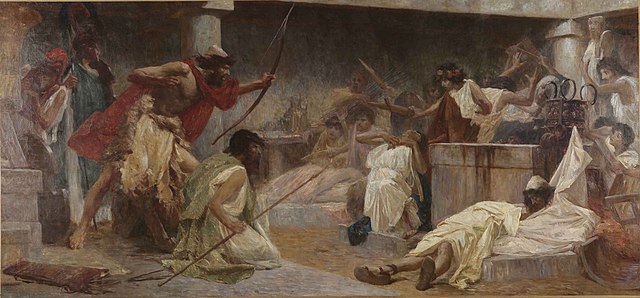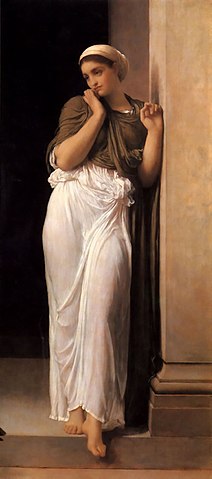Notes on the Odyssey
One notable thing about the Iliad is that it inspired a huge number of other poets and playwrights to use it as source material for their own works. Some filled in the gaps left by Homer, since he’d only addressed a relatively small part of the Trojan War, while others covered the adventures of the poem’s heroes after the war. The Greeks themselves were the most prolific and successful at this, but the Romans and even modern authors, musicians, and filmmakers have attempted their own additions and adaptations to the epic. I think it’s safe to say the most celebrated of these attempts was the Aeneid, making Virgil the world’s greatest author of fanfiction, but we’ll get to his work some other time.
Today, I thought I’d share some observations on the only official sequel, the Odyssey. This one needs less of an introduction than the Iliad, since it’s one of the few Classical works still commonly assigned to high school and college students, at least among Americans. I still won’t assume much familiarity - after all, I’m writing in large part for people who’ve finished schooling and are ready for an education. Since it is more accessible than the Iliad, though, I’ll talk about it less formally than I did about that epic and just offer a few observations about it.
So, as you might guess from the title Odyssey follows Odysseus after the Trojan War, whose trip home went about as well as every other hero’s - badly.
Very badly.
In Odysseus’ case, he already had Poseidon against him, and his situation only worsened when his crew of sailors offended Helios, the sun god, by eating his cattle (to be fair, they were pretty hungry). As punishment, though he will be allowed to return home eventually, he spends ten years lost in the Mediterranean enduring multiple shipwrecks and near-shipwrecks, almost getting eaten by a cyclops, having much of his crew turned into pigs (they get better), and suffering the torment of sleeping with a supernaturally hot chick for a few years only to get back home and find a bunch of suitors trying to woo his wife while eating up the sustenance of his household.
Now, one interesting thing about the Odyssey is that it feels more modern and novel-like than the Iliad. Though both are clearly products of their time, Odyssey has more of the types of events that we expect from an adventure story, and whereas Iliad’s narrative is linear, Odyssey skips between two protagonists and most of Odysseus’ voyage is told in a flashback. The epic actually begins with Odysseus’ son Telemachus who, encouraged by Athena, unsuccessfully confronts the suitors eating away his inheritance. Only after the first few books do we get to Odysseus, stranded on Circe’s island, and we don’t learn about his voyage so far until a few books after that, when he tells his story to the Phaecians, who were entertaining him as a guest after one of his shipwrecks.
The first 2/3 or so of the book is, as one would expect from a work of this stature, exceptional storytelling, though if I may venture to criticise Homer I did think that things started to drag once Odysseus made it home to Ithaca. Most modern novelists would, I expect, spend only a few chapters on Odysseus dealing with the suitors, but Homer spends several books detailing how Odysseus revealed himself to his son and Eumaeus, his faithful swineherd, how they devised a plan to kill the suitors, tested the loyalty of the other servants, and so on. It’s still good material, but I do wish Homer had consulted an editor and maybe trimmed a scene here and there. The final confrontation with the suitors is still extremely satisfying, though.
First-time readers who are already familiar with some of the epic’s most famous scenes may be surprised at how briefly Homer passes over many of them. The lotus-eaters, the sirens, and sailing past Scylla and Charybdis, for example, though all fairly well-known even with modern audiences, are passed over in a few stanzas. There are a few exceptions, though. Homer spends a lot of time on both Circe and the cyclops, for instance.
Perhaps my favourite scene in the epic is the visit with the dead. Odysseus makes a sacrifice and calls forth souls from the underworld to get some information from Tiresias, but also takes some time to catch up with his mother and with his fellow veterans of Troy, some of whom he didn’t even know had died. It’s a classic example of the standard literary motif of the visit to the underworld; Dante’s is the most famous, but one can also find it in ancient myths and in poems from Ovid’s Metamorphoses and Virgil’s Aeneid to Ezra Pound’s Cantos. In fact, the Cantos begin with a loose translation of just this part of the Odyssey, which at the time Pound was writing was believed to be the oldest part of the epic. It’s like Pound used the Cantos as a way to visit the dead on his own, using (roughly) the oldest work in the Western literary canon as a starting-point.
I’d be remiss if I didn’t also add a few words on Nausicaa. Though she’s a secondary character who doesn’t receive as much attention as some of her admirers would like, she’s remarkable for keeping her composure and her willingness to help the shipwrecked Odysseus, who’d landed naked and undoubtedly quite wild-looking on the shore. Her girlish modesty is, I think, especially charming. Homer notes, for example, that, “Before her father, she was too ashamed to speak of her own wedding,” and when she offers to guide Odysseus through her city one of her primary concerns is with what gossip and rumours people may spread if the two of them are seen walking together.
Eumaeus the swineherd is another fan favourite. A loyal servant and all-around good guy, the poet himself seems to have been rather fond of him. The Odyssey is narrated entirely in the third-person, except for a few instances when Homer mentions this character, “and you, Eumaeus, O my swineherd.” Though Homer uses the second person a few times in the Iliad, Eumaeus is the only character addressed this way in the Odyssey.
One minor disappointment is that we get fewer of the similes that are so great, and frequent, in the Iliad. There are a handful, though, like when Odysseus awaits sundown so he can leave the Phaecians:
Just as, when day is done, a man who longs
for supper after tending two dark oxen
who’ve drawn his jointed plow through fallow fields
will greet with joy the setting of the sun
and—glad—at last head home to take his meal,
knees weary as he goes: so did Odysseus
welcome the setting of the sun.
Finally, a few words on choosing a translation, because the number of options can be overwhelming. If you’re like me you may be tempted to choose an early translation, like George Chapman’s or Alexander Pope’s, and though they do have some literary merit in their own right I’d advise come caution in doing so as they can be little difficult to follow and, in Chapman’s case, don’t stick as closely to the text as modern readers expect. As for modern translations, I’ve read Lattimore’s, Fitzgerald’s, and Mandelbaum’s. Lattimore is a bit dry, but I can easily recommend either of the other two. I did like Lombardo’s version of the Iliad, aside from a few instances of overly-modern language for my taste, so I imagine his version of the Odyssey would also be a viable option. Fortunately, Wikipedia has a handy list of translators of Homer, complete with the first few lines of each major version, so it’s easy to get a quick sample of each.
So, there you have it, the second great epic of the Western literary tradition. Homer is arguably history’s greatest poet, and reading both of his epics will be very beneficial to anyone interested in studying literature, as later authors refer to and borrow from him constantly. Even aside from that, though, the Odyssey is, simply, one of the greatest and most entertaining adventure stories ever written.

